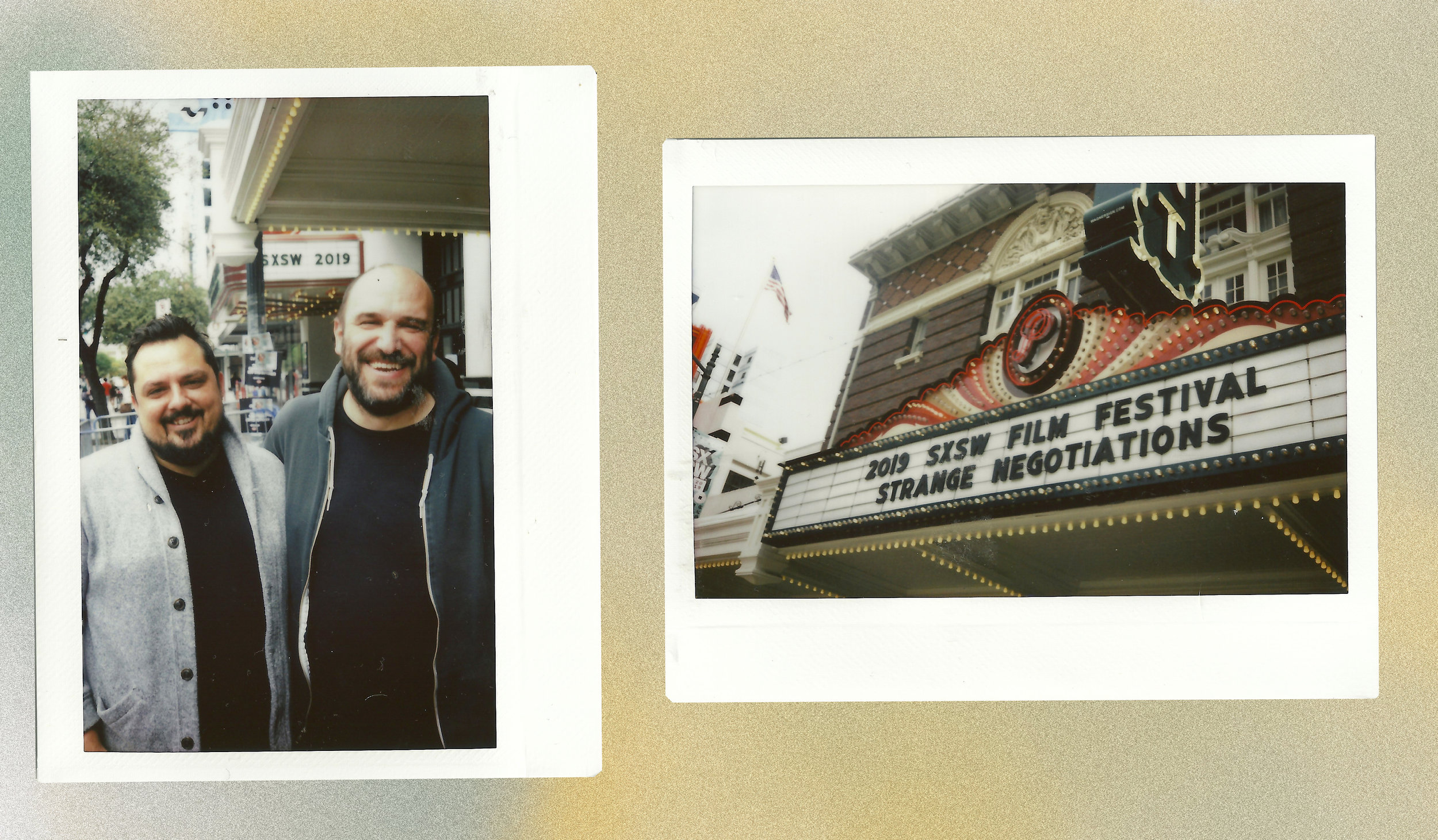essay: Strange Negotiations

David Bazan sits behind the wheel of a van. He’s back on I-95. He’s happy to be back, as he says. His eyes are tired and there’s an ever present grief in the back of his voice. This confession of sorts plays out throughout Brandon Vedder’s documentary film, Strange Negotiations. The film is a lot of Bazan, alone, in a van.
To those who've toured for extended periods of time, these sequences have an odd familiarity to them. You drive, load in, sit around, find a place to eat, play a show, socialize, load out, drive and finally sleep...somewhere. Lather, rinse, repeat. That’s the beauty and the danger of touring. There’s so much focus on the day to day, get from point A to point B level of survival mode that it becomes easy to write off personal needs and flaws within the system.
Now take everyone else out of that equation. You’re left alone with yourself for hours, days, even weeks on end. The core focus becomes those flaws within the system. You drive, alone, load in, alone, sit around, alone, find a place to eat, alone, play a show, alone, socialize, load out alone, drive and finally sleep...somewhere, alone. This is the life that Bazan has leaned into following the demise of Pedro the Lion. It leaves him on the road most days out of the year playing solo shows in living rooms and small clubs to sustain a home life that he watches from the road. Strange Negotiations reads as a complicated love letter to life on the road and the solitary self-reflection you find yourself in when behind the wheel. It sits in those quiet moments within the van.
The solo Living Room Shows were forged out of Bazan’s grapple with his own faith. In the modern evangelical world, Christianity and a relationship with God are expected to be the center of your identity, rather than just a personality trait or an add on to the human experience. When that’s removed, what are you left with? For Bazan, he found himself deeply battling with his own inner demons muffled by intense drinking. He describes losing his relationship with a Christian God like losing a close friend or a confidant.
His eyes remained fixed on the road as he drives, speaking of the overwhelming loss of identity and community. These sequences of long drives as Bazan speaks alone mirror the ritual of praying. Like an old habit, it plays out similar yet different. Later that evening after a living room show, a fan turns to Bazan confessing “I miss church, honestly”. But in the space, a semblance of church is what they’ve created. The music looks a little different. The communion looks a little different. Regardless, these community spaces are carved out of necessity and transcend the isolation of the human experience. Every person in that room has at least one thing in common that brings them there and as the night plays out, Bazan encourages others to seek more than that one thing that connects them.
Within the film’s final act, Bazan acknowledges that this life isn’t exactly what he signed up for. The amount of time away from his family and deep isolation contrasts the core fundamental goal of “being in a band.” He returns to the roots of why he started this and the process that brought him creative success.
“This thing feels like Pedro again,” he explains, as the film leads into footage from three Pedro the Lion shows at the Tractor Tavern in Seattle, Washington. The shows occurred just shortly after it was announced that the prolific moniker and shadow of Bazan’s past was back on. The documentary ends on a familiar sight: driving up to the venue and loading in. This time we’re in a full van, which includes guitarist Erik Walters and drummer Sean Lane. They load in for yet another show. And this time, Bazan is no longer alone.
It’s no secret Bazan has been very vocal in his criticism of toxic masculinity both in person and online. Throughout the film, I found myself thinking back to the many Pedro the Lion sets I’ve seen, some playing back on the screen in front of me. In a sea of young men (I guess not so young anymore) within the audience I often struggled to find my place. I sometimes left shows early because Trouble With Boys will make me cry too much. In those moments, I thought about how those specific performances are not for me. They’re for the men in the audience, those who still need to learn, who need to hear from another man.
So many men have grown up idolizing Bazan and continue to look to him to navigate their male experience. There’s a level of radical vulnerability shown over and over within Strange Negotiations, Bazan is seen numerous time, crying, as he recounts missing his wife and his kids. He explores in so many ways a deep desire to live an honest, true life and connect with those around him. This radical vulnerability is important and beautiful. It needs to be at the forefront of what we’re lifting up in terms of modern masculinity.
Here we have two male creatives, a filmmaker and a musician. Both industries are wildly male dominated and drowning in toxic masculinity. These days I need and want men to do the work. The emotional labor, the therapy, the soul searching, the growing up. We can’t do it for them anymore, or at least I can’t. I hope this time, the people watching Bazan in this film — particularly those men that I often felt out of place among — realize this film is for them, this notion of challenging modern masculinity in culture is one they need to hear.

